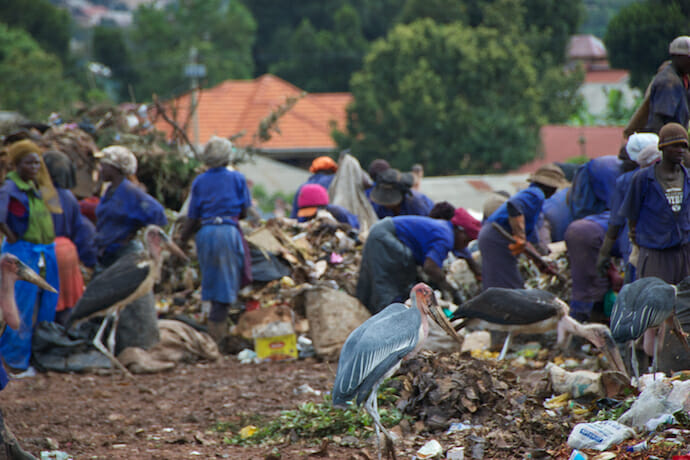
Health
Studies Show the Horrid Health Effects of Landfill Exposure
Humankind has civilized itself, so it’s said. And yet, we still have to manage a lot of problems that feel anything but civilized. How many dolphins and whales choke on ocean-borne plastic in an average year? How much lead is in our drinking water? How much smog is OK in the air, and how long before the population starts seeing its collective IQ measurably decline?
And what about all our landfills?
It’s long overdue for America and other world powers to come to terms with how poorly we manage our garbage — and explain why it’s somehow easier to ship it to China instead. But there’s one element in our ongoing struggle with waste that’s a relatively new addition to the conversation. It has to do with the harmful effects of living one’s life in the shadow of a landfill. As scientists have come to understand, but which hardly feels surprising, this is one of the last places you’d want to find yourself.
Living Near Humanity’s Garbage
According to The World Counts, human beings generate more than 2 billion tons of garbage in a given year. Of all the material objects we spend our money on, 99 percent of them end up in a landfill within six months. And it’s not just an environmental and health problem, either. The management of our garbage fuels civil unrest within countries and even heightens tensions between nations.
The waste situation in Indonesia is a particularly appalling case. The government there, having struggled for decades with the management of the country’s garbage, must now incentivize its poorest citizens to live near landfill “mountains” by paying them a monthly sum of 200,000 rupiahs. If that sounds like a generous stipend, it’s not. It’s the equivalent of $13 American dollars.
The struggle of managing mountainous landfills and the distribution of a population is nothing new. Indonesia is home to hundreds of ethnic groups and languages, plus 261 million people spread across 17,000 islands, according to 2016 estimates. Living a low- or even middle-wage life there, as a growing and hungrily capitalist population looks down upon you as one would a wastepaper basket, is more than a challenge.
But it’s also a nearly perfect, and perfectly grim, encapsulation of the larger problem humanity has with garbage. The $13 Indonesians receive in exchange for building their lives in the shadow of a landfill doesn’t remotely make up for the “grievous” water pollution, which forces residents to drink and bathe from purchased bottled water every day of the year. And conditions are becoming ever worse there, with 7,000 tons of waste getting trucked into the area daily. And with the population growing, and with fewer than ever citizens able to eke out a living by selling garbage to repurposing companies, things look grim indeed.

Here’s how Indonesia is, sadly, fairly representative of humanity’s total lack of a long-term vision when it comes to handling our collective waste.
Exporting Waste and Shorter Lifespans
There’s a reason the Chinese government has ended its importation of waste from the U.S. They’ve been storing and processing much of the world’s garbage for years. However, with the economic situation there on the rise, and with the environmental effects of these decades of abuse well-known and worsening, China is now refusing to host American garbage, meaning we’ll have to seek out new and unspoiled dumping grounds. Geopolitics aside, the reason is clear: The country cannot stomach any more garbage.
So, predictably, America has already pivoted to Thailand, Vietnam, and Malaysia as our new midden heaps. And so begins another cycle of ever-worsening environmental conditions and ever-worsening public health. Along with our garbage, we simultaneously export shorter and poorer lifespans.
A research project from Brazil, titled “Socio-Environmental and Hematological Profile of Landfill Residents,” sought to uncover some of the health-related damage our ongoing landfill crisis is causing in both the First and Third World. By comparing blood samples from residents nearby Brazil’s São Jorge landfill with samples from “unexposed” residents, the Brazilian scholars concluded citizens located near landfills are at a substantially higher risk of developing diseases such as the following:
Lymphocytosis. The signs of this disorder include an abnormally high count of lymphocytes in the blood. It can be harmless or it can presage worse conditions, such as cancers, infections, and autoimmune disorders.
Neutropenia. A low count of neutrophils in the blood can cause serious infections, especially in children.
Anemia. A dangerous lack of healthy red blood cells results in chronic tiredness and fatigue.
Leukopenia. A low count of white blood cells compromises the body’s ability to fight off infections.
According to UNICEF, in 2013, 340,000 children died across the globe due to a lack of basic hygiene, sanitation, and potable drinking water — all hallmarks of living near landfills, exacerbated by the subsistence existence some of these citizens must endure. Handling, transporting and processing waste, to make what Americans would consider a far-below-poverty wage, is a lifestyle most in the U.S. can’t and wouldn’t want to imagine. And yet our very decadence is the thing causing the problem.
Dematerialization Is the Only Answer
The industrialized world has been pretending for decades that its garbage problem would magically solve itself. It should be obvious now that this was always a fantasy. China’s about-face when it comes to taking our garbage within their borders should have been a wake-up call. Instead, America is already trashing other, less developed, countries in the region.
The entire cycle will continue again and again until one of two things happens: we run out of space, or we figure out how to live worthy lives while bringing fewer short-lived material objects into the world. All this appears to be an ongoing, worldwide lesson in impulse control — and if not that, an urgent call for innovative problem-solving that doesn’t involve shoveling our problems under somebody else’s rug.

